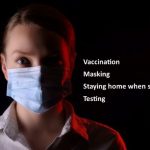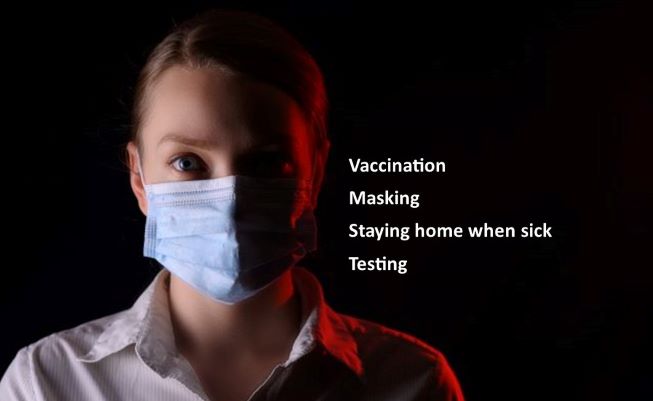 Omicron is very good at evading the immune protection conferred by vaccines, natural infection and agents such as monoclonal antibodies (mAbs) authorized to prevent serious infections, according to David Ho, MD, the director of the Aaron Diamond AIDS Research Center and the Clyde ’56 and Helen Wu Professor of Medicine at Columbia University Vagelos College of Physicians and Surgeons, in New York City.
Omicron is very good at evading the immune protection conferred by vaccines, natural infection and agents such as monoclonal antibodies (mAbs) authorized to prevent serious infections, according to David Ho, MD, the director of the Aaron Diamond AIDS Research Center and the Clyde ’56 and Helen Wu Professor of Medicine at Columbia University Vagelos College of Physicians and Surgeons, in New York City.
This is one reason COVID-19 cases continue to surge around the country, and 95% can be attributed to the omicron variant, according to the CDC. On Jan. 5, a total of 705,264 new cases were reported—more than doubling the January 2021 peak.
This surge in cases has led to an increase in hospitalizations. Between Jan. 3 and 9, hospitalizations due to COVID-19 rose 32.5%, and are averaging about 14,917 per day, according to the CDC data tracking. Many new cases are among vaccinated people, but the large majority of hospitalizations are still among unvaccinated individuals.
Monoclonal Antibodies
At least two mAbs available under the FDA emergency use authorization are not as effective against omicron as previous strains: bamlanivimab plus etesevimab (Eli Lilly) and casirivimab plus imdevimab (Regen-COV, Roche).
Late last year, the United States held back on shipments of these two mAb cocktails, but resumed shipping them. However, the Department of Health and Human Services warned that they should be used for patients in areas where delta remains the significant cause of COVID-19 infections.
“If the Delta VOC [variant of concern] still represents a significant proportion of infections in a region and other options are not available or are contraindicated, eligible patients can be offered bamlanivimab plus etesevimab or casirivimab plus imdevimab, with the understanding that these treatments would be ineffective if the patients are infected with the Omicron VOC. This concern can be mitigated if virus-specific diagnostic testing in a given patient indicates infection with the Omicron VOC is unlikely,” the HHS said in a recent update.
The HHS said sotrovimab (GSK/Vir Biotechnology), which was authorized in May, is still effective, as are the new oral and IV antivirals. But infectious disease experts at an Infectious Diseases Society of America press briefing on Jan. 11 said patients cannot rely on mAbs, not only because they don’t work but they are hard to get, and urged people to get vaccinated.
“Vaccination makes the biggest difference,” said Jeanne Marrazzo, MD, MPH, FIDSA, the director of the Division of Infectious Diseases, the University of Alabama at Birmingham. “And that’s critically important right now because we’ve got nothing else to treat ambulatory patients with COVID.
“We have limited access to monoclonal antibodies that work. In fact, we have none right now; we’re waiting on a shipment. We don’t have the oral drugs yet, and we don’t have any other options. So really, really important to try to protect yourself, and boosters, of course, are going to augment that protection.”
Joshua Barocas, MD, an associate professor of medicine at the University Colorado School of Medicine, Anschutz Medical Campus, in Aurora, said the medication shortages and ineffectiveness against omicron are concerning because “treatment is effectively our last line of defense.
“To my knowledge to date, only one of the monoclonal antibodies really has efficacy at this point against the variant,” Dr. Barocas explained. “And that happens to be the monoclonal antibody that we have the least of. It is also the variant that we’re seeing the most of. So, there is a huge mismatch between the demand because of the sheer number of cases of omicron and the supply of this one monoclonal antibody.”
He added that hospitals across the country were putting together protocols to prescribe remdesivir (Veklury, Gilead) and nirmatrelvir-ritonavir (Paxlovid, Pfizer) instead. Merck and Ridgeback’s oral drug molnupiravir (Lagevrio) is also authorized for use in the United States.
However, both oral treatments have limitations. Nirmatrelvir-ritonavir is not recommended for those with severe kidney or liver impairment, and molnupiravir is limited to situations where there is no other alternative.
And remdesivir is only authorized for hospitalized patients. However, a phase 3 study found that it was safe and effective in reducing disease progression among patients who were not hospitalized (N Engl J Med 2021 Dec 22. doi:10.1056/NEJMoa2116846).
Participants receiving remdesivir in the randomized, double-blind, placebo-controlled trial had an 87% reduction in risk for the composite primary end point of COVID-19–related hospitalization or all-cause death by day 28 and an 81% reduction in the risk for the composite secondary end point of COVID-19–related medical visits due to COVID-19 or all-cause death by day 28 compared with placebo.
“These data provide evidence that a three-day course of remdesivir could play a critical role in helping COVID-19 patients stay out of the hospital. While our hospitals are ready to assist patients in need, prevention and early intervention are preferable to reduce the risk of disease progression and allow patients not requiring oxygen to recover from home when appropriate,” said Robert L. Gottlieb, MD, PhD, a cardiologist at Baylor University Medical Center and Baylor Scott & White Research Institute, in Dallas, and primary author of The New England Journal of Medicine article, who called remdesivir a frontline tool against COVID-19.
A striking feature of the omicron variant is the alarming number of changes in the virus’s spike protein that could affect effectiveness of current vaccines and therapeutic antibodies (Nature 2021 Dec 23. doi:10.1038/d41586-021-03824-5).
A study by Dr. Ho and his colleagues tested the ability of antibodies generated by vaccination to neutralize the omicron variant in laboratory assays that pitted antibodies against live viruses and pseudoviruses constructed in the lab to mimic omicron.
Antibodies from people vaccinated with any of the four most widely used vaccines—AstraZeneca, Johnson & Johnson, Moderna and Pfizer-BioNTech—were significantly less effective at neutralizing the omicron variant compared with the ancestral virus. Antibodies from previously infected individuals were even less likely to neutralize omicron. Individuals who received a booster shot of either of the two messenger RNA vaccines are likely to be better protected, although even their antibodies exhibited diminished neutralizing activity against omicron.
“The new results suggest that previously infected individuals and fully vaccinated individuals are at risk for infection with the omicron variant,” Dr. Ho said. He added he is unsure that even a third booster would be adequate against this variant.
When administered early in the course of infection, mAbs can prevent many individuals from developing severe COVID-19. But the new study suggested that all of the therapies currently in use and most in development are much less effective against omicron, if they work at all.
In neutralization studies with mAbs, only one (BrII-198, approved in China) maintained notable activity against omicron. A minor form of omicron is completely resistant to all antibodies in clinical use today. The authors noted that omicron is now the most complete escapee from neutralization that scientists have seen.
Because of this, Dr. Marrazzo emphasized the need for continuing the multilayered strategy proposed by the CDC: vaccination, masking, staying home when you are sick—not just from COVID-19, but any respiratory disease—and testing. She called the strategy the “best way out of this phase of the pandemic.”

















